|
|
|
Sort Order |
|
|
|
Items / Page
|
|
|
|
|
|
|
| Srl | Item |
| 1 |
ID:
108248
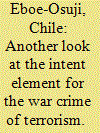

|
|
|
|
|
| Publication |
2011.
|
| Summary/Abstract |
The modern basis of the war crime of terrorism may be found in the terms of article 51(2) of Additional Protocol I (1977) to the Geneva Conventions of 1949, replicated in article 13(2) of Additional Protocol II. The provision forbids attacks carried out for the 'primary purpose of spreading terror' among a civilian population. In view of this provision, the judges of the International Criminal Tribunal for the former Yugoslavia have pronounced terrorism to be a crime of 'specific intent'. In an extension of this reasoning, a Trial Chamber of the Special Court for Sierra Leone has recently held that the crimes of enslavement and militarization of children do not qualify as terrorism, because they were not found to have been committed for the 'primary purpose of spreading terror'. The aim of this paper is to examine the correctness and limits of the proposition that terrorism is a crime of specific intent. In the context of that inquiry, the Rome Statute is examined for what it is able to contribute to the discussion.
|
|
|
|
|
|
|
|
|
|
|
|
|
|
|
|
| 2 |
ID:
108254
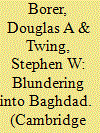

|
|
|
|
|
| Publication |
2011.
|
| Summary/Abstract |
Some postmortems of the Bush Administration's pre-Iraq war decision-making have focused on a dysfunctional National Security Council (NSC) structure as the major reason for the lack of a thorough strategic assessment prior to the March 2003 invasion. Other academic and journalistic accounts have focused on a lack of a first rate conceptual thinker at the top levels of the Bush Administration as an important cause of the strategic shortcomings in Iraq decision-making. This article will assess the relative impact of decision-making structure versus quality of strategic leadership in explaining poor performance in the first five years of the Iraq war.
|
|
|
|
|
|
|
|
|
|
|
|
|
|
|
|
| 3 |
ID:
108253
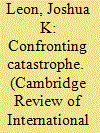

|
|
|
|
|
| Publication |
2011.
|
| Summary/Abstract |
Social environments played a powerful role in the institutional adaptations of the AIDS fighting agencies within the United Nations system. Since its AIDS apparatus has become operational, the UN has undertaken two major strategic shifts. The first shift saw the dissolution of the GPA, a small subunit of the WHO in favour of UNAIDS, a dedicated agency engaged in global advocacy. This shift involved a controversial bureaucratic process that led, finally, to a more human rights-based approach to the disease. The second shift saw an increased emphasis on ground-level efficiency. What caused these changes? Contributions in the rationalist tradition expect the UN to act as a multilateral goal-seeker looking to optimally address a major gap in global governance. A sociological framework sees normative changes within the UN as catalysts for change in its goals and structure. A synthesis of these traditions conceptualizes the UN's strategic shifts more clearly, capturing the interactive process between the organization and its strategic environment. UN agencies were forced to rationally adapt to changing conditions in prevailing AIDS norms.
|
|
|
|
|
|
|
|
|
|
|
|
|
|
|
|
| 4 |
ID:
108252
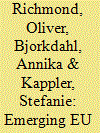

|
|
|
|
|
| Publication |
2011.
|
| Summary/Abstract |
The European Union (EU) is now emerging as a major actor in regional and global peacebuilding. Yet its peacebuilding approach and practices are subject to some significant and familiar contradictions. In this article, we identify the basis for what may become an 'EU peacebuilding framework' (EUPF), and argue that, while it aspires to a 'just and durable peace' including practical tools and a normative framework, these need to be set in critical relief. The EU's nascent approach to building peace is compared and contrasted with the evolving liberal peacebuilding consensus and the much criticized statebuilding project which has recently emerged. This is evaluated against recent research focusing on developing a more sophisticated form of contextually relevant peacebuilding. Finally, we assess how the embryonic EUPF might contribute to the development of a just and durable peace, and ask what sorts of issues and dimensions this raises.
|
|
|
|
|
|
|
|
|
|
|
|
|
|
|
|
| 5 |
ID:
108246


|
|
|
|
|
| Publication |
2011.
|
| Summary/Abstract |
This article assesses the structure and operation of the International Criminal Court by setting out a case for the defence of the Court, a case for its prosecution and a verdict. Defenders of the Court suggest it has had a positive impact because: it has accelerated moves away from politics and towards ethics in international relations; it goes a long way towards ending impunity; it is a significant improvement on the previous system of ad hoc tribunals; it has positive spill-over effects onto domestic criminal systems; and because the courage of the prosecutor and trial judges has helped to establish the Court as a force to be reckoned with. Opponents of the Court see it as mired in power politics, too reliant on the United Nations Security Council and on state power to be truly independent; failing to bring peace and perhaps even encouraging conflict; and starting to resemble a neo-colonial project rather than an impartial organ of justice. The verdict on the Court is mixed. It has gone some way to ending impunity and it is certainly an improvement on the ad hoc tribunals. However it is inevitably a political body rather than a purely legal institution, its use as a deterrent is as yet unproven and the expectation that it can bring peace as well as justice is unrealistic.
|
|
|
|
|
|
|
|
|
|
|
|
|
|
|
|
| 6 |
ID:
108251


|
|
|
|
|
| Publication |
2011.
|
| Summary/Abstract |
This article explores the possibility of locating an 'ethics of memory' respecting commission of mass atrocities via the link between justice, truth and memory. First, it suggests a typology for memory in relation to justice in its retributive and restorative aspects. Second, it explores how so-called 'memory-justice' arises in the course of international proceedings-and particularly given its significance under the Rome Statute-by considering, critically, the international community's ability to repair or restitute injury by engaging in memory in 'the right way'. Lastly, it suggests limitations of memory-justice of which only some can be overcome. The challenges and arguments for a 'categorical imperative' for memory are left for a subsequent treatment, but arguments in law and practical ethics will be suggested in favour of properly approaching memory in pursuit of justice, with profound consequences for the nascent Court and sister tribunals, in their efforts to break the cycle of conflict in affected regions, and rid the world of the worst crimes known to humanity.
|
|
|
|
|
|
|
|
|
|
|
|
|
|
|
|
| 7 |
ID:
108247


|
|
|
|
|
| Publication |
2011.
|
| Summary/Abstract |
The article outlines US dissatisfaction with the International Criminal Court (ICC), before assessing the strengths and weaknesses of US objections from the point of view of international law. It concludes that most of the concerns expressed by the United States are either overstated or legally flawed but that there is good reason to object to the abrogation, for the purposes of trial before the ICC, of the immunities conferred by international law on at least certain US personnel.
|
|
|
|
|
|
|
|
|
|
|
|
|
|
|
|
| 8 |
ID:
108249


|
|
|
|
|
| Publication |
2011.
|
| Summary/Abstract |
This article assesses the utility of victim participation in the trials before the Extraordinary Chambers in the Courts of Cambodia, in fostering reconciliation and realizing restorative justice. Specifically, it investigates the parameters of a legal mechanism designed to give 'victims of atrocity' a voice, whilst striking a vital balance between rights of victims and rights of defendants to a fair trial. Where participation affords victims the opportunity to present their views and observations, thereby enhancing prospects for retributive and restorative justice, this article submits that participation affords the international community an historic opportunity to meet Rome Statute objectives to 'not only to bring criminals to justice but also to help the victims themselves obtain justice' (See Victims Witness Section at the ICC, < www.icc-cpi.int/Menus/ICC/Structure+of+the+Court/Victims>). Indeed while concrete benefits of participation remain to be seen, victim participation in the ECCC's case offers promise for breaking new ground, setting international standards and establishing precedence for other ad hoc and hybrid tribunals as well as the permanent International Criminal Court.
|
|
|
|
|
|
|
|
|
|
|
|
|
|
|
|
| 9 |
ID:
108255


|
|
|
|
|
| Publication |
2011.
|
| Summary/Abstract |
When policy-makers use force to achieve political ends, they use the word 'victory', yet its meaning is frequently left unclear. Policy-makers are using force for new purposes (peace operations, preemption, state-building, democracy promotion, counterinsurgencies and counterterrorism), but the language and thinking on victory in these new situations has not kept pace with the times. The essential problem is that the term 'victory' is an imprecisely defined concept for guiding decisions about military intervention. Everyone, from scholars to policy-makers, should understand that the failure historically to develop a precise concept of victory weakens the ability of policy-makers to use force effectively and contributes to confusion when societies debate whether to use force. This article seeks to make three fundamental contributions towards reducing the ambiguity that surrounds the term 'victory' in the strategic studies literature. First, it establishes the renewed importance of the question: 'what is precisely the meaning of "victory?"' Second, it presents a typology for understanding the nature of victory. Third, it uses this typology to reevaluate the contributions of prominent and lesser-known thinkers in strategic studies whose ideas have contributed to the scholarship on what it means to achieve victory in war.
|
|
|
|
|
|
|
|
|
|
|
|
|
|
|
|
| 10 |
ID:
108250
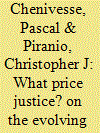

|
|
|
|
|
| Publication |
2011.
|
| Summary/Abstract |
Following the Second World War, evolving notions of human rights have been met by evolving understandings of rights that should be afforded the accused in judicial processes. The following considers this evolution in proceedings stretching from Nuremberg to The Hague, as a struggle between forces that have given birth to each successive stage in international criminal justice, as well as of forces that have grounded rights of defence as advancing the cause of justice itself. Indeed, while notions of 'right to fair trial' and 'equality of arms' suffer from conflicted understandings over what consists in justice, and from conflicting interests over what powers should be afforded parties in the judicial process, this article suggests that the primacy afforded rights of the accused reflects, most evidently in the International Criminal Court, the growing acceptance of liberal democratic notions that justice is most clearly founded not on the treatment of victims, but on the treatment afforded those who mistreat others.
|
|
|
|
|
|
|
|
|
|
|
|
|
|
|
|
|
|
|
|
|